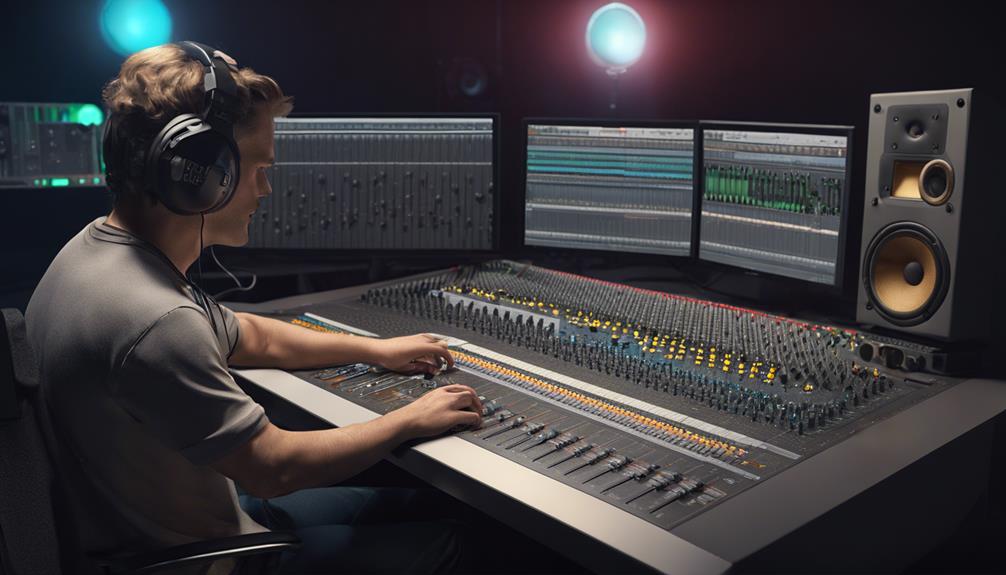Audio Engineer Job Description
An Audio Engineer guarantees sound quality and production excellence in studios and live events. They maintain, set up, and test audio equipment, troubleshoot issues, and collaborate with stakeholders. Skills include technical expertise, sound system knowledge, problem-solving, and creativity. Education involves audio engineering principles, formal training, and hands-on experience. Work environments vary and require acoustics management, noise control, and close client collaboration. Career growth involves networking, ongoing learning, certifications, and specialization in areas like sound design or managerial roles. Learn more about the dynamic world of Audio Engineering for a fulfilling career.
Key Takeaways
- Ensure quality sound production and clarity in various settings.
- Conduct equipment setup, testing, and maintenance for optimal performance.
- Troubleshoot audio issues during productions efficiently.
- Collaborate with stakeholders to coordinate live events seamlessly.
- Utilize technical expertise and creativity for audio effects.
Responsibilities of an Audio Engineer
The main responsibility of an Audio Engineer is to guarantee the quality and clarity of sound in different audio production settings. This involves a range of tasks, including sound equipment maintenance and live event production.
Sound equipment maintenance is a vital aspect of an Audio Engineer's role. This includes making sure that all audio equipment is properly functioning and in optimal condition. Audio Engineers are responsible for setting up, testing, and maintaining audio equipment such as microphones, speakers, amplifiers, and mixing boards. They must also troubleshoot any issues that may arise during audio production to minimize disruptions and ensure a seamless sound experience.
In live event production, Audio Engineers play a key role in setting up sound systems, conducting sound checks, and ensuring that the audio quality meets the desired standards. They work closely with event organizers, performers, and other production staff some to deliver an excellent audio experience for the audience. This involves coordinating with multiple stakeholders to understand their audio requirements and executing them effectively during live events.
Essential Skills and Abilities
Possessing a diverse skill set and a keen understanding of audio technology are essential for excelling as an Audio Engineer. Technical expertise is paramount in this role. Audio Engineers must have a deep understanding of sound systems, recording equipment, and editing software. They should be proficient in operating mixing consoles, microphones, and audio processors. Problem-solving skills are crucial as they often need to troubleshoot issues with sound quality, equipment malfunctions, or acoustic challenges in different environments.
Moreover, creativity plays a significant role in the success of an Audio Engineer. They must be able to think outside the box to achieve the desired audio effects and meet the creative vision of clients. Attention to detail is another vital skill as even the smallest oversight can significantly impact the final audio product. Whether it's ensuring balanced sound levels, eliminating background noise, or fine-tuning audio effects, precision is key. In a nutshell, a successful Audio Engineer combines technical expertise, problem-solving skills, creativity, and meticulous attention to detail in their work.
Educational Requirements and Training
A vital understanding of audio engineering principles and practical experience are foundational for aspiring professionals seeking to enter the field. Many audio engineers pursue formal education through programs in audio engineering, sound production, or related fields at technical schools, community colleges, or universities. These programs typically cover topics such as acoustics, sound design, mixing techniques, and equipment operation. Additionally, hands-on training with industry-standard software and hardware is essential for developing the necessary skills.
Certification options can also enhance an audio engineer's credentials. Organizations like the Audio Engineering Society offer certifications that validate proficiency in specific areas of audio engineering. These certifications can help professionals stand out in a competitive job market and demonstrate their commitment to ongoing learning and skill development.
It is essential for aspiring audio engineers to stay informed about job market trends. The industry is constantly evolving, with advancements in technology shaping the way audio is recorded, mixed, and mastered. Keeping up-to-date with the latest developments can provide a competitive edge and open up new opportunities for growth and specialization.
Work Environment and Conditions
In the domain of audio engineering, the work environment and conditions play a pivotal role in shaping the daily experiences of professionals in this field. Audio engineers often work in diverse settings, from recording studios to live concert venues, each with its unique challenges and requirements. Studio setups are vital, as engineers must guarantee ideal acoustics and equipment placement for quality sound production. Noise levels can vary greatly, requiring engineers to adapt and use soundproofing techniques to maintain a controlled environment.
Equipment maintenance is a key aspect of an audio engineer's daily routine. Regular upkeep of recording devices, microphones, and other gear is essential to ensure smooth operations and high-quality output. Additionally, client interactions are common, with engineers collaborating closely with artists, producers, and other professionals to understand their specific needs and deliver tailored audio solutions.
Navigating through dynamic work environments, managing equipment efficiently, and fostering positive client relationships are essential skills for audio engineers to thrive in this field. The ability to adapt to varying conditions while maintaining technical excellence is paramount for success.
Career Opportunities and Advancement
Career growth in the field of audio engineering offers professionals the opportunity to expand their skills and expertise while taking on more challenging projects and responsibilities. Audio engineers can expect competitive salary expectations as they progress in their careers, with the potential to earn substantially more with experience and expertise. The job outlook for audio engineers remains positive, with a steady demand for professionals in various industries such as music production, film, television, and gaming.
- Networking Opportunities: Engaging in industry events, conferences, and online platforms can provide audio engineers with valuable networking opportunities to connect with other professionals, potential clients, and employers.
- Industry Trends: Staying updated on the latest industry trends, technological advancements, and software developments is critical for audio engineers to remain competitive and relevant in the ever-evolving field.
- Advancement Paths: Pursuing advanced certifications, specializing in niche areas such as spatial audio or sound design, or moving into roles like audio director or studio manager are common paths for audio engineers seeking career progress.
Conclusion
To sum up, the role of an audio engineer is akin to a maestro orchestrating a symphony of sound waves, shaping and sculpting audio to perfection. With a keen understanding of technology and a creative flair, audio engineers bring music, dialogue, and effects to life.
Through technical expertise and artistic vision, they create immersive experiences that captivate audiences and elevate productions to new heights. The world of audio engineering offers endless opportunities for those with a passion for sonic innovation.







